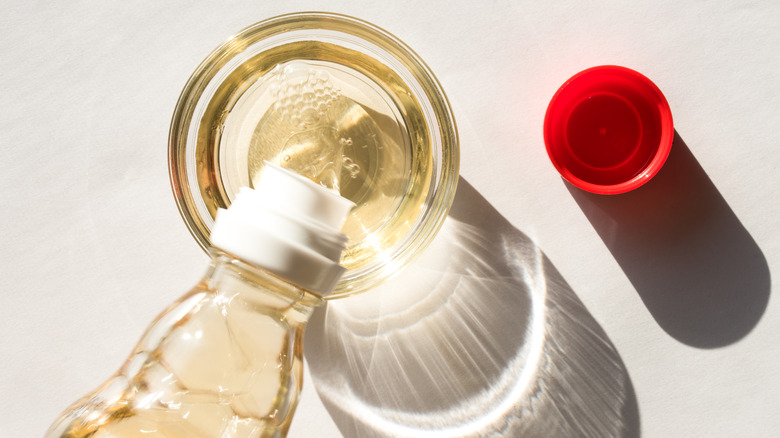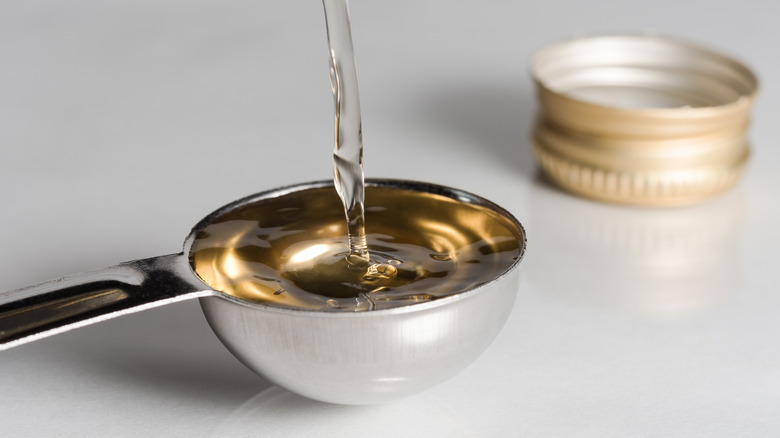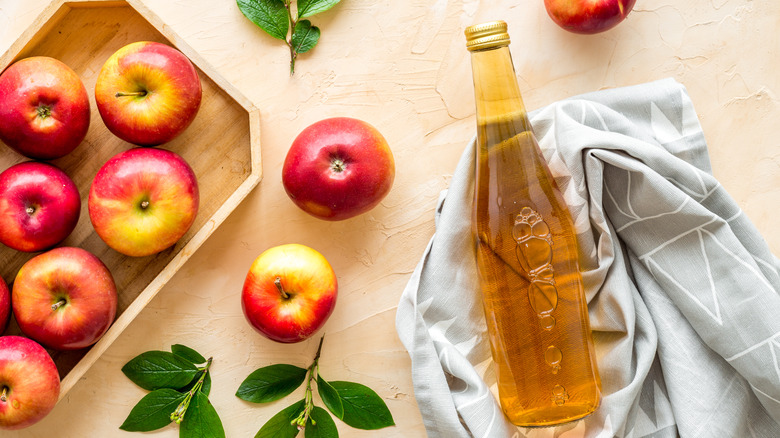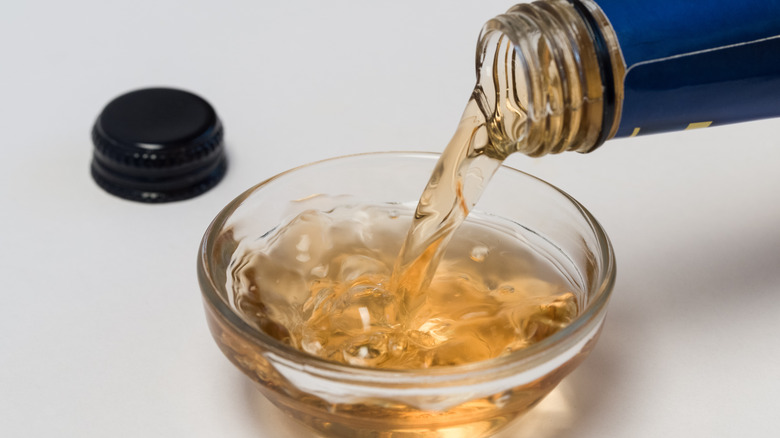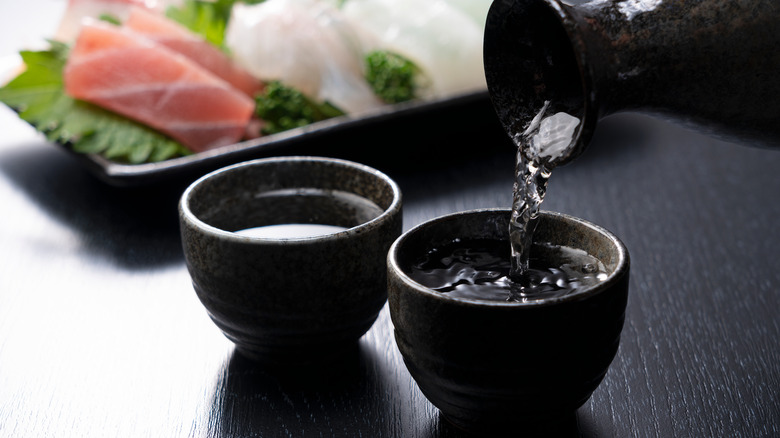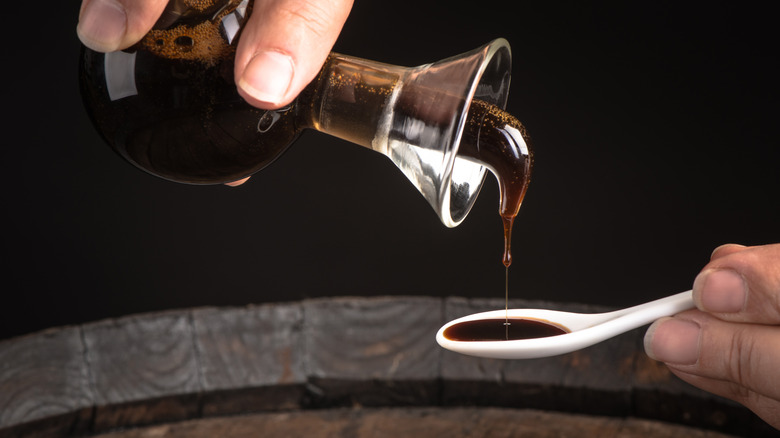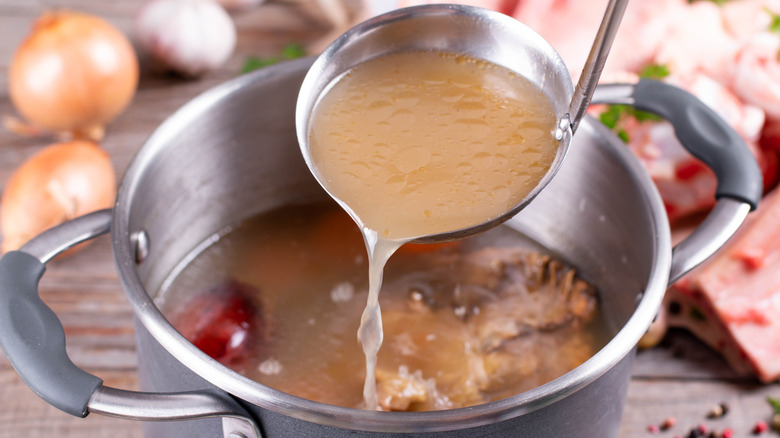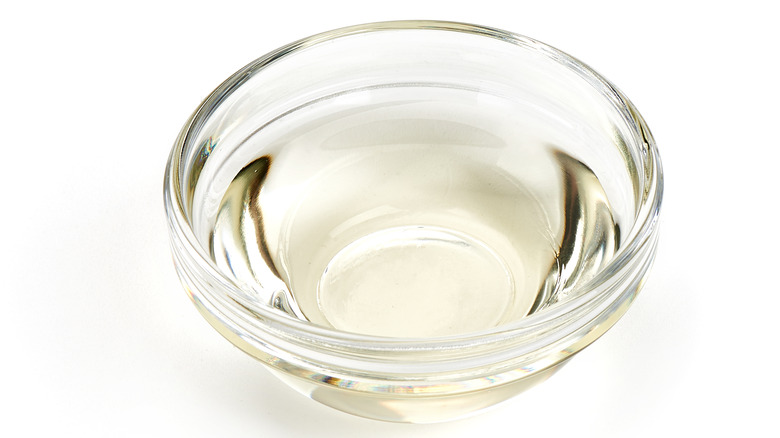10 Best Substitutes For Rice Wine Vinegar
First, let's clear up a few common misconceptions: rice wine, like Japanese sake, is not the same thing as rice wine vinegar. While fermented rice is the base of both, they still have their differences, and one of the principal differences is this: Though rice wine can be used for drinking or cooking, you really don't want to sit back and sip a glass of rice wine vinegar.
Also known simply as rice vinegar — which is the same thing as rice wine vinegar — this popular ingredient "is made by fermenting the starches in rice using an acetic acid bacteria known as Mother of Vinegar (Mycoderma aceti)" (via Healthline). While not all that high in nutritional value, rice wine vinegar has no appreciable vitamins or minerals, but at least unsweetened, non-seasoned rice vinegar is very low in calories and sugars. This mild, lightly bitter, tangy fluid is a welcome addition to all sorts of dishes.
Rice wine vinegar can be used on rice (of course), when cooking fish, as a salad dressing, in stir-frys, in sauces and marinades, and in myriad other applications, according to The Chicago Tribune. If you find yourself working on a recipe that calls for rice wine vinegar yet you don't have a bottle of the stuff on hand, no worries: There are plenty of great substitutes for rice wine vinegar.
1. White wine vinegar
It's probably little surprise that arguably the best one-for-one way to replace rice wine vinegar is with white wine vinegar. While sourced from grapes, this vinegar has a similar acidity to its rice-derived counterpart, albeit with a bit less sweetness, but if needed, you can compensate for that as needed with other ingredients. According to Healthline, adding about a ¼ teaspoon of sugar to a 1 tablespoon serving of white wine vinegar will help you achieve a very similar flavor profile.
If you are taking things the other way, using rice vinegar in place of white wine vinegar, you may want to use a bit less than is called for to tamp down the sweetness some. In terms of storage, handling, and all, you can treat these two different types of vinegar as interchangeable.
2. Apple cider vinegar
Apple cider vinegar is a great stand-in for rice wine vinegar if need be. It can be used in place of its rice-based buddy in marinades, sauces, dressings, and more, and is even suitable for use with sushi and other foodstuffs you might think demand rice vinegar (via Healthline). Again, as with white wine vinegar, adding a bit of sugar can help create a better substitute for rice wine vinegar, which is sweeter than apple cider vinegar.
And unlike rice vinegar, which as noted is not all that nutritious, apple cider vinegar boasts several health benefits. According to the Cleveland Clinic, these include lots of antioxidants, which help prevent damage to cells in the body, probiotics that can improve digestive and immune health, and it may help regulate blood sugar and improve the function and health of your heart, too. Granted, you will have to consume a fair amount of the stuff for any meaningful benefits.
For apple cider vinegar, Healthline explains you can do a one-for-one swap with rice wine vinegar, adding a ¼ teaspoon of sugar to maintain the sweetness most rice vinegars offer.
3. Champagne vinegar
According to Stonesoup, champagne vinegar is a great substitute for rice wine vinegar because it's not as strong as other wine-based vinegars. That means you can use it without worrying that its flavors will overpower your dish, such as you may properly fear could happen with something like balsamic vinegar.
And don't be thrown by the name of this fancy-sounding vinegar, which is not in fact related to French Champagne wines. According to MasterClass, it's a combination of Chardonnay and Pinot Noir grapes that have been fermented with a vinegar mother, giving it a light flavor.
This vinegar is often less flavorful than rice vinegar, so don't be afraid to pour it on liberally (but of course do a taste test or two as you pour).
4. Sherry vinegar
If it's the blend of sweet acidity you're after, PureWow explains that sherry vinegar is a great swap if you've found you're out of rice vinegar. The outlet says to be cautious though as the flavor is a touch bolder, so any dishes or recipes that solely rely on rice vinegar's taste may not do best to have sherry vinegar involved. But this being said, Stonesoup says they're most similar in terms of acidity in comparison to other substitutes.
If you're aiming to switch it out, a 1:1 ratio will be sufficient for a wide range of dishes.
5. Lemon juice (or lime juice)
Lemon and lime juice pack plenty of acidity, and that acidity is a major component in the flavor you want from your rice wine vinegar, thus these citrus juices can stand in for the vinegar in a pinch. According to Stonesoup, while they're very different from the rice wine vinegar that may be called for in a recipe, these juices can really highlight the flavors in your dish like vinegar can.
However make sure to only add citrus juice to a dish a little at a time, as they do have a comparable but different flavor than rice wine vinegar and can quickly become overpowering. If you need more physical fluid with less potent flavor, cut the lemon or lime juice with some water.
6. Rice wine
Rice wine can be used as a stand-in for rice wine vinegar with a number of caveats. First, note that some rice wines are sweet, some are milky in appearance, and others are quite strong in alcohol content. To find a decent substitute for rice vinegar, you need to use a rice wine that's dry, as low in ABV as you can find, and that is pale and transparent in appearance. Also, consider splashing a bit of white vinegar in along with the rice wine to increase the acidity.
Beyond serving as a sub for rice vinegar, rice wine can also be a great cooking ingredient itself. Sake — which is often confused for rice wine — can be another last-ditch attempt at replacing rice wine vinegar. LifeHacker explains that it's great in marinades, broths, and other liquid concoctions. Just make sure the liquid will simmer for a while if you are using a lot of rice wine in your cooking so that the alcohol cooks off.
You can use a blend of rice wine and white vinegar as a substitute for the rice vinegar; mix these two ingredients evenly, and then use a bit less of this blend than you would actual rice vinegar, as it has a slightly more potent taste.
7. Balsamic vinegar
Thick, syrupy balsamic vinegar is a poor substitute for rice vinegar and is frankly best left unused; the recipe will simply have to make due without vinegar. A thinner balsamic, however, can be used in place of rice wine vinegar in some recipes, ideally ones in which it will not be cooked, or cooked too much. A case where this would be an acceptable swap is in marinades, stir-fry sauces, and salad dressings.
You may want to water down a balsamic — even a thinner one — prior to using it in place of rice vinegar because the flavor profile of these aged, grape-based vinegars is often much more intense than you would get with a pale rice-derived vinegar. In this case, you'd want to use only a splash rather than substituting the entire amount.
8. White wine
A splash of white wine can be used to replace rice wine vinegar in a pinch, and note that, going the other way, light vinegars can be worthy step-ins for wine in your cooking as well. Make sure you choose a dry white wine and avoid one with flavor profile added by aging in oak barrels, as these can take the taste of the recipe far off course. But a wine like a Pinot Grigio or Sauvignon Blanc can add a touch of complexity that would otherwise be lacking due to the absence of the vinegar.
You can consider also adding a bit of citrus juice to increase the acidity when you are using wine in place of rice wine vinegar. You'll want to have about a 1:1 ratio in most cases.
9. Chicken broth
Chicken broth is commonly used interchangeably with white wine in cooking, especially for broths and soups. To replace rice wine vinegar with chicken broth means you need a decidedly potent broth, given the intensity of rice vinegar compared to white wine. To achieve this concentration of flavor, you can create your broth using half the amount of water called for when prepping the broth with bouillon, or you can simmer a pre-made (or homemade) broth for a while to cool off excess water and let the flavors grow more focused.
As with other options on our list, adding a dash of citrus or white vinegar to the broth can accentuate the acidity, and you can use it in a 1:1 swap.
10. White vinegar
Make no mistake about it, on its own, white vinegar is not a great substitute for rice wine vinegar. It's much stronger of a flavor and should be blended with white wine, chicken or vegetable broth, or even a dash of citrus and some water to add complexity and cut the harshness. At the same time, white vinegar can certainly be better than nothing when it comes to replacing rice wine vinegar.
As discussed earlier, blending rice wine and white vinegar can make a decent substitute for rice wine vinegar; if you don't have rice wine, you can blend white wine or sherry with white vinegar in even parts, again using a bit less than you would with actual rice wine vinegar.
If replacing rice vinegar with only white vinegar, you may want to strongly consider adding some sugar to the liquid, because most white vinegars will be completely devoid of the sweetness you expect from a more mellow, nuanced rice vinegar. Again, use slightly less than your recipe calls for and (if possible) taste as you go.
